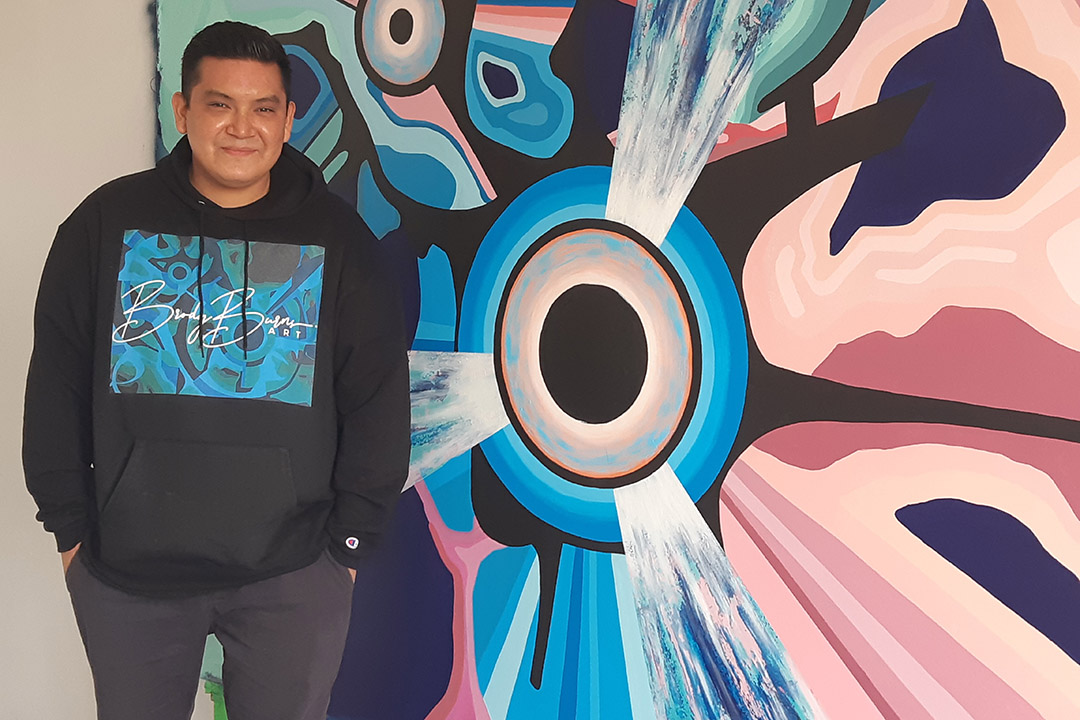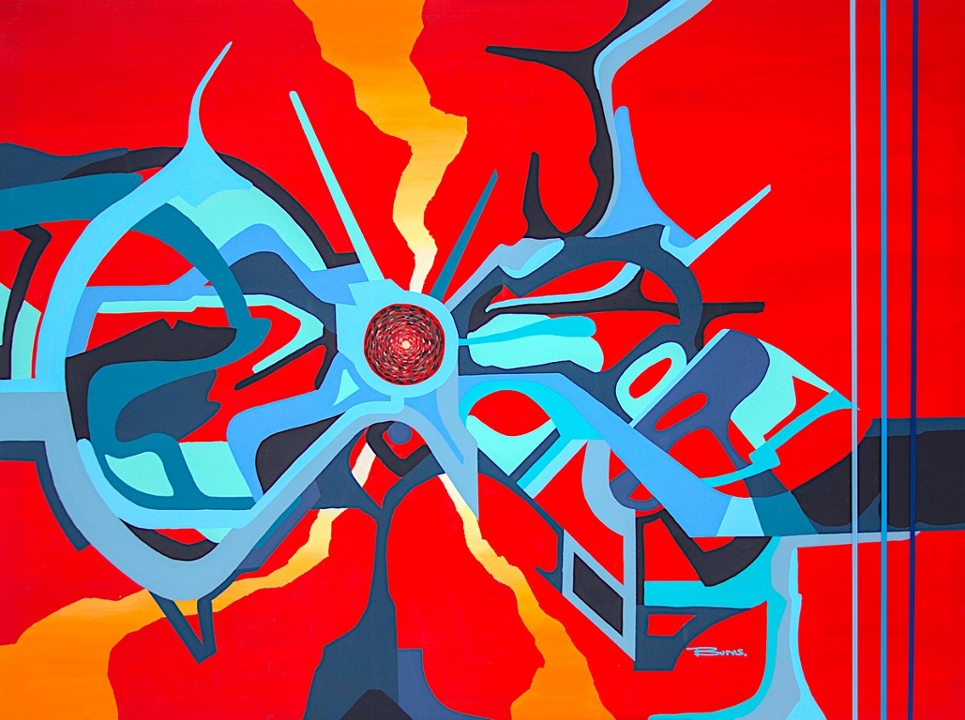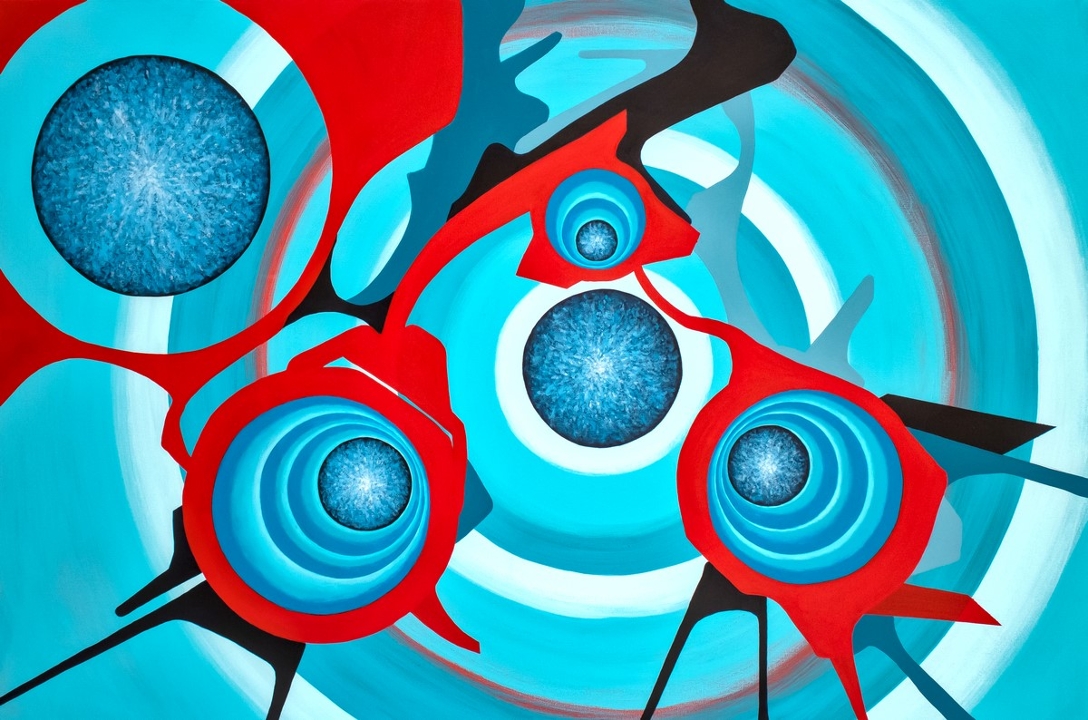
Focus on art helps USask student overcome pandemic hardships
Like many people around the world, the COVID-19 pandemic has taken a toll on Brody Burns mentally, emotionally and physically.
By Shannon BoklaschukHowever, the University of Saskatchewan (USask) graduate student also feels fortunate to have a creative outlet to help him deal with the ongoing global health crisis.
“This whole time, since lockdown, I’ve been working on artworks,” said Burns, who is pursuing a Master of Fine Arts (MFA) degree in the Department of Art and Art History in USask’s College of Arts and Science.
Burns, an emerging Treaty Six Plains Cree artist from the James Smith Cree Nation, portrays through his artwork what he sees as the interactions between spirit, energy, vibrations and the cosmos. Burns aims to encourage people to think beyond the physical world to our existence in the universe. His work is influenced by ceremonies of his culture, graffiti and artists such as Alex Janvier, Kevin Pee-ace and Jerry Whitehead.
Burns said he has been interested in art for his entire life—often doodling in class as a child—but he recalls a particularly pivotal moment when he was introduced to influential Indigenous artists during the first year of his Bachelor of Arts degree at USask. He also began taking art and art history classes as electives as he pursued his undergraduate degree in psychology, which he received during USask’s 2021 Spring Convocation.
“That just kind of changed the whole direction of my life,” he said.
As an undergraduate student at USask, Burns’ first major foray into the art world came in the form of a residency with the Bridges Art Movement (BAM) in Saskatoon. The residency culminated in an exhibition called Beyond the Physical, which was on display in August 2019. The show was inspired by Burns’ background as a graffiti artist in Saskatoon and cultural experiences, such as sweats and sun dances. The residency with BAM connected him with other artists living and working in Treaty Six Territory and gave him a glimpse into what his life could be like as a professional artist.
When Burns first began his educational journey at USask, however, art as a career wasn’t on his radar. At the time, his goal was to become a counsellor or a psychotherapist working with Indigenous people on and off First Nations reserves.
“There’s a lot of intergenerational trauma,” he said. “Family members have gone through residential schools and day schools.”

While attending USask, Burns began participating in more cultural ceremonies and learning more about Cree cultural traditions. At the same time, he was also learning about how the brain works through his undergraduate psychology courses, as well as exploring other subject areas, such as physics, and furthering his artistic practice.
Burns now plans to pursue art as a full-time career and is also considering how art can be utilized as a form of therapy and to promote healing. He experienced firsthand how art can help people through challenging circumstances when the USask campus closed in 2020 due to COVID-19 and he began living and studying at home on a full-time basis.
“Pretty much I had a rollercoaster (experience). Everybody was living in the same house and home 24/7, so everybody was getting on each other’s nerves,” said Burns, whose hobbies before the pandemic included working out and playing the drums. “There was no place to go; I didn’t go to the gym and couldn’t play drums. I was a huge fitness guy and I gained 50 pounds.”
As the pandemic continued, Burns also experienced emotional changes and changes in eating and sleeping patterns. However, he felt his life begin to get back on track after visiting an Elder’s sweat lodge and fasting for three days in the summer of 2020. His developing art practice also remained a bright light and a beacon of hope for him, as he continued to paint and draw even as COVID-19 changed his daily routines.
This past summer, a self-produced solo exhibition of Burns’ work, titled The Void, was on display at the Drinkle building in downtown Saskatoon from July 30 to Aug. 28. In a social media post, Burns described the body of paintings featured in The Void as “a reaction, a reflection and a narrative to what the pandemic caused.”
“I felt in between everything and lost since the whole country shut down,” he wrote. “I utilized this time to heal and focus on my well-being.”
One of Burns’ paintings from The Void, titled Raedon, graced the cover of the Winter 2021 edition of the University of Saskatchewan Undergraduate Research Journal (USURJ) when he was an undergraduate psychology student. In the journal, Burns noted that Raedon is about the insomnia he experienced during the pandemic in the middle of December 2020.
Another of Burns’ paintings, Awakening, was also featured in USURJ. In the journal, he wrote that the piece is about overcoming the hardships brought about by the pandemic and “represents healing, strength and a clear focus for the future regardless of things going on outside of ourselves.”
“I adapted and found ways to stay motivated to finish a degree despite the challenges and changes because of COVID,” he said in an interview.
Burns is now focused on his MFA studies, which he began in September 2021. He has created a website to showcase his artwork and has also developed a line of clothing that features his pieces from The Void. As well, Burns is serving as a teaching assistant at USask and is working with the USask Art Galleries and Collection.

As part of his role at the galleries, Burns and fellow USask graduate Kyle Zurevinski (BFA’18, BA’19) worked on The Snelgrove Salon: Part II, an exhibition that was installed in the Gordon Snelgrove Gallery this past summer. As a result, Burns and Zurevinski had the opportunity to view many artworks in the USask Art and Art History Collection, document and catalogue them and develop an exhibition. They also rehung several of the hallways in the Murray Building as part of their curatorial development.
Additionally, Burns was pleased to have an opportunity to recently assist with artistic projects at USask in recognition of the first National Day for Truth and Reconciliation on Sept. 30. As part of activities on campus during the week of Sept. 27, the Truth and Reconciliation Commission’s Calls to Action were projected on the Peter MacKinnon, Thorvaldson and Murray buildings.
“We set up a lot of projectors that displayed the TRC Calls to Action,” Burns said, describing the resulting effect as “incredible.”
Burns said he is enjoying his time at the galleries and is grateful to Prof. jake moore, director of the USask Art Galleries and Collection and a faculty member in the Department of Art and Art History, for the opportunity. Through his role, Burns has been able to meet emerging and established artists in the community.
“jake has really opened up a lot of doors for me,” he said.
Burns is also excited about what he will learn through his MFA degree and is looking forward to continuing his educational journey at USask. He is focusing on his culture and spirituality, and plans to continue to utilize his artistic practice to explore these important areas of his life.
As a result of all that he has been through since the pandemic began, Burns has advice for other students who may be struggling.
“I would say just find something that you love doing and to hold onto that—and keep consistently working on that project or whatever form it may take,” he said. “For me, it was very easy (to find a passion) because I love painting, and it helped me through a lot of things in life.”

